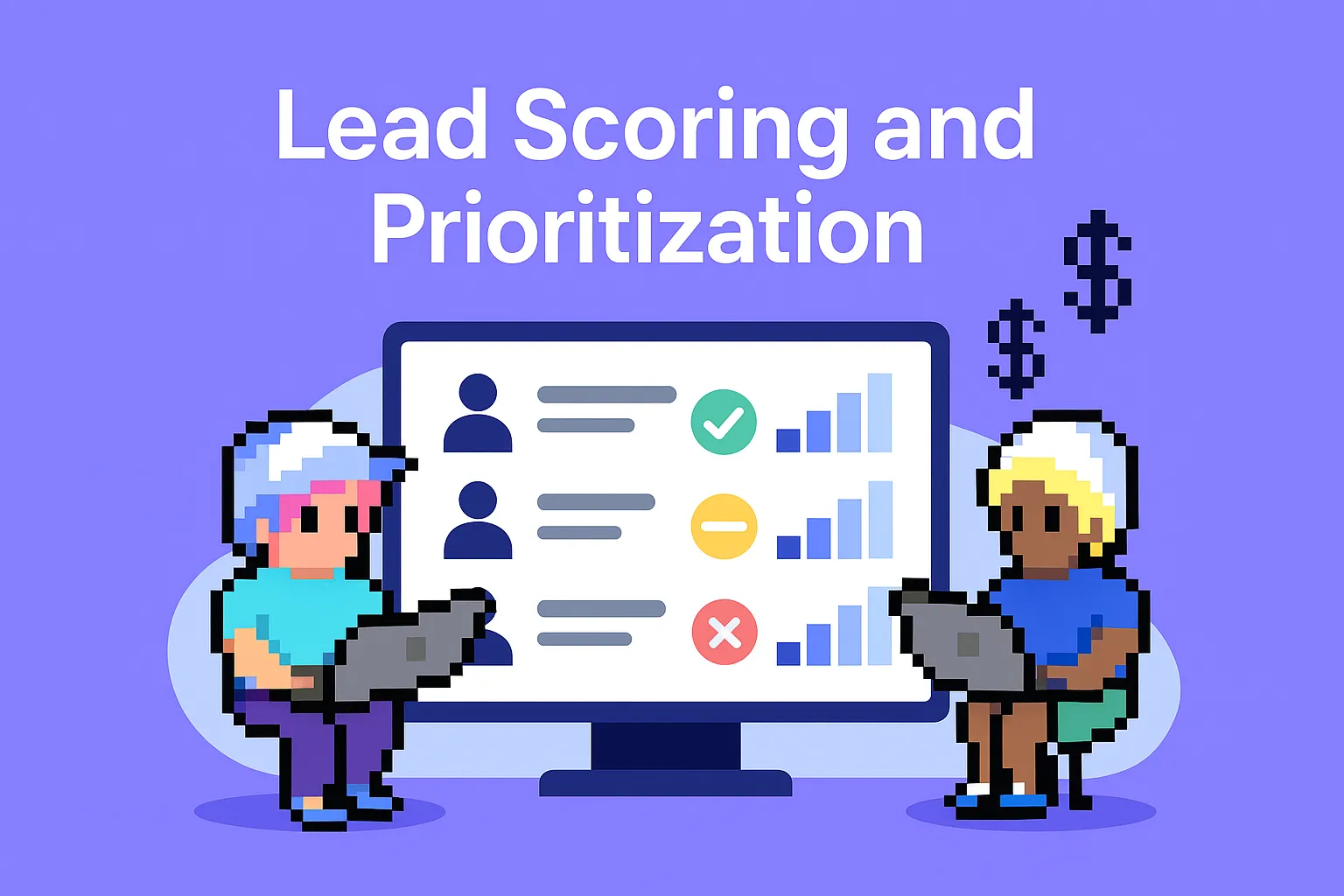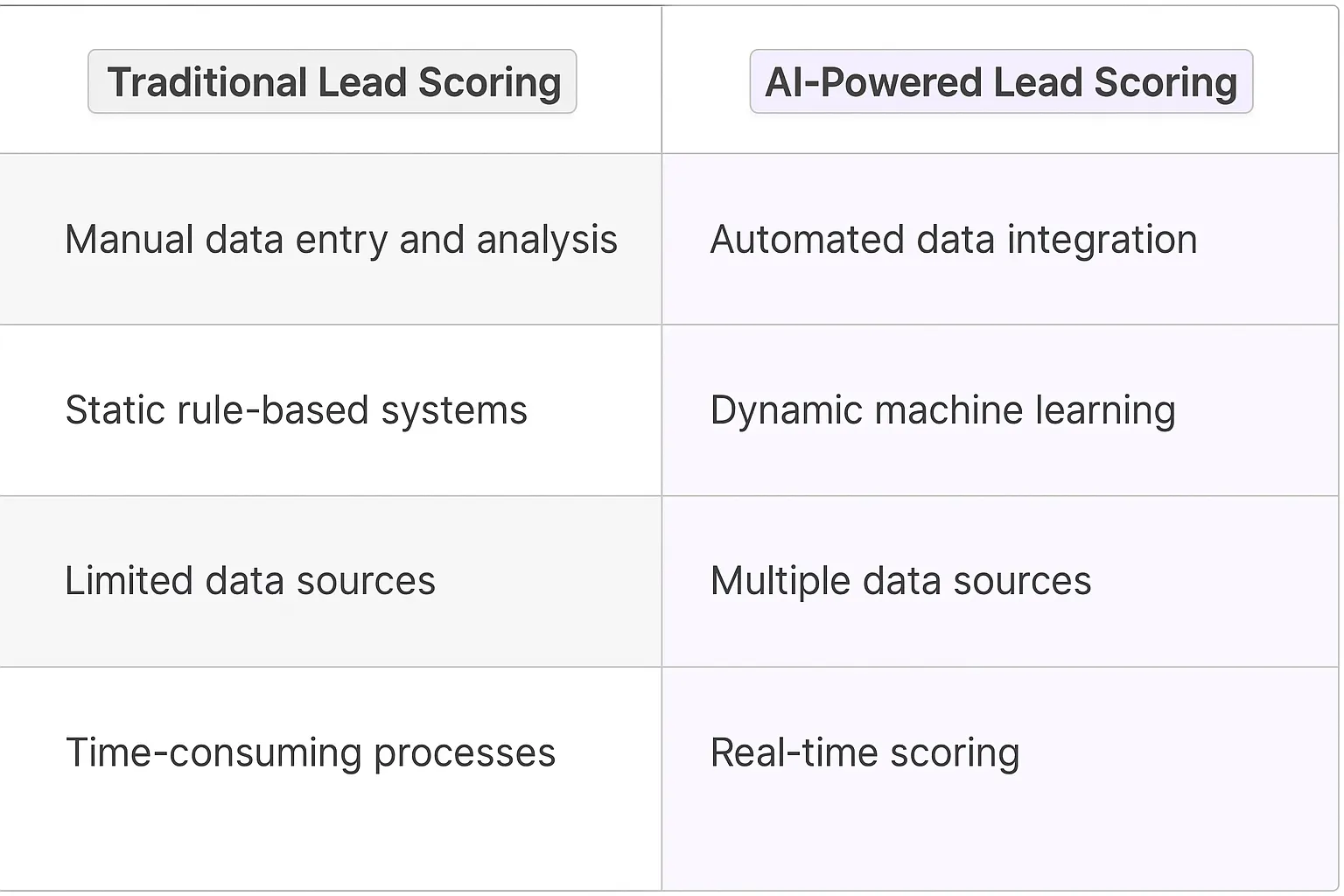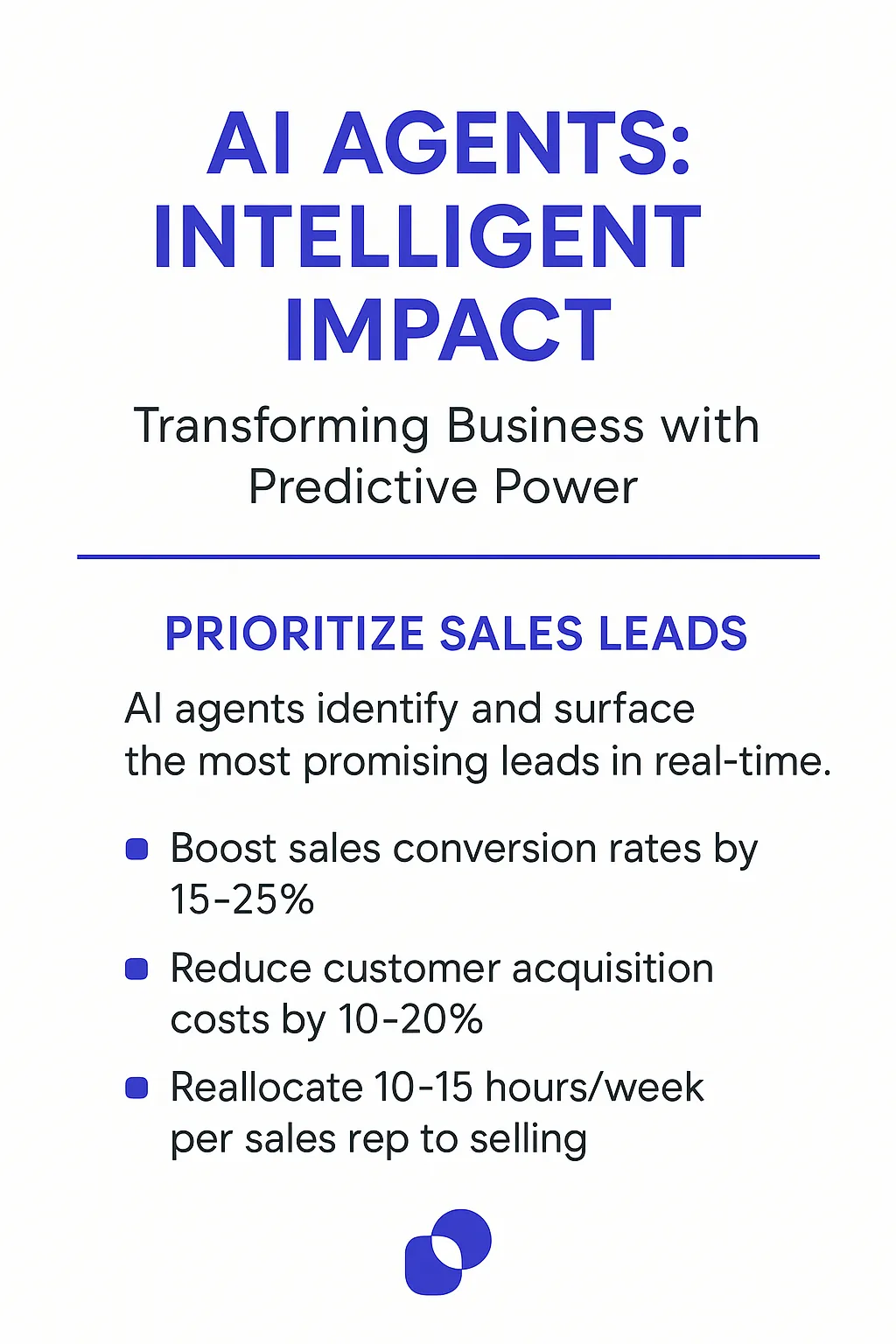Lead Scoring and Prioritization AI Agents
Understanding AI-Powered Lead Scoring and Prioritization
What is Lead Scoring and Prioritization?
Lead scoring and prioritization is the process of ranking potential customers based on their likelihood to convert into paying clients. It's a critical component of modern sales and marketing strategies, allowing businesses to focus their resources on the most promising leads. Traditionally, this process relied heavily on manual analysis and gut instinct. Now, AI agents are taking it to a whole new level.
Key Features of Lead Scoring and Prioritization
AI-powered lead scoring and prioritization systems offer several key features that set them apart:1. Data integration: They pull information from multiple sources, including CRM systems, social media, and web analytics.2. Machine learning algorithms: These systems use advanced algorithms to identify patterns and predict lead quality.3. Real-time scoring: Leads are continuously evaluated and re-scored based on new data and interactions.4. Personalized insights: AI agents provide tailored recommendations for engaging with each lead.5. Scalability: These systems can handle massive amounts of data, making them suitable for businesses of all sizes.6. Adaptive learning: The AI continuously improves its predictions based on feedback and outcomes.

Benefits of AI Agents for Lead Scoring and Prioritization
What would have been used before AI Agents?
Before AI agents entered the scene, lead scoring and prioritization was a messy, time-consuming process. Sales teams relied on static rule-based systems, gut feelings, and endless spreadsheets. They'd manually sift through leads, trying to spot patterns and prioritize based on limited data points. It was like trying to solve a Rubik's Cube blindfolded – possible, but incredibly inefficient.
CRM systems offered some help, but they were essentially glorified databases. Sales reps would spend hours updating fields, hoping their inputs would somehow magically reveal the hottest leads. Spoiler alert: they rarely did. The result? High-value opportunities slipped through the cracks, while sales teams wasted time on low-potential leads.
What are the benefits of AI Agents?
Enter AI agents – the secret weapon for modern sales teams. These digital teammates are like having a team of data scientists, working 24/7 to uncover hidden patterns and predict which leads are most likely to convert. Here's why they're game-changers:
1. Superhuman pattern recognition: AI agents can analyze vast amounts of data from multiple sources – CRM entries, email interactions, social media activity, and more. They spot correlations and trends that humans simply can't, identifying high-potential leads with uncanny accuracy.
2. Real-time adaptation: Unlike static scoring models, AI agents continuously learn and adjust. They pick up on subtle changes in buyer behavior, market trends, and even seasonal fluctuations, ensuring your lead scoring stays razor-sharp.
3. Personalized prioritization: Every business is unique, and AI agents get that. They tailor their scoring algorithms to your specific sales cycle, industry, and customer base. The result? A prioritized list of leads that actually makes sense for your business.
4. Time-saving automation: AI agents handle the grunt work, freeing up your sales team to do what they do best – building relationships and closing deals. No more manual data entry or endless report generation.
5. Predictive insights: These digital teammates don't just score leads; they provide actionable insights. They can predict the best time to reach out, suggest personalized talking points, and even forecast deal sizes.
6. Reduced bias: Human-led lead scoring is prone to unconscious biases. AI agents evaluate leads objectively, ensuring you're not missing out on opportunities due to preconceived notions.
7. Scalability: As your business grows, manually scoring leads becomes increasingly unmanageable. AI agents scale effortlessly, handling millions of data points without breaking a sweat.
The bottom line? AI agents for lead scoring and prioritization aren't just an incremental improvement – they're a paradigm shift. They transform your sales process from a guessing game into a data-driven, highly efficient machine. In the world of B2B sales, where every missed opportunity costs real money, that's not just nice to have – it's a competitive necessity.

Potential Use Cases of AI Agents for Lead Scoring and Prioritization
Let's dive into how AI agents can transform lead scoring and prioritization. These digital teammates aren't just fancy algorithms; they're game-changers that can redefine how sales teams operate.
Processes
- Dynamic Lead Scoring: AI agents can continuously analyze and update lead scores based on real-time data, ensuring your sales team always focuses on the hottest prospects.
- Behavioral Pattern Recognition: These digital teammates can identify complex patterns in lead behavior across multiple touchpoints, providing insights that humans might miss.
- Predictive Lead Qualification: By leveraging historical data and machine learning, AI agents can predict which leads are most likely to convert, allowing for more efficient resource allocation.
- Automated Lead Nurturing: AI can tailor nurturing campaigns based on individual lead characteristics and behaviors, ensuring each prospect receives personalized attention.
Tasks
- Data Enrichment: AI agents can automatically gather and synthesize data from various sources to create comprehensive lead profiles.
- Lead Segmentation: These digital teammates can categorize leads into highly specific segments based on multiple criteria, enabling targeted marketing efforts.
- Engagement Scoring: AI can track and score lead interactions across various channels, providing a holistic view of engagement levels.
- Priority Alerts: When high-value leads show increased interest or engagement, AI agents can instantly notify the sales team, ensuring timely follow-ups.
- Churn Prediction: For existing customers, AI can analyze usage patterns and engagement to flag accounts at risk of churning, allowing for proactive retention efforts.
The beauty of these AI-driven use cases lies in their ability to operate at scale while maintaining a level of precision that would be impossible for human teams alone. They're not replacing sales reps; they're amplifying their capabilities, allowing them to focus on what humans do best: building relationships and closing deals.
As these AI agents evolve, we'll likely see even more sophisticated applications. Imagine AI that can predict not just which leads will convert, but also the optimal timing and approach for each individual prospect. Or consider AI that can dynamically adjust lead scoring models based on market trends and competitive landscapes.
The companies that effectively leverage these AI capabilities will have a significant edge in the market. They'll be able to identify and capitalize on opportunities faster, reduce customer acquisition costs, and ultimately drive more revenue. It's not just about working smarter; it's about fundamentally reimagining how we approach lead management in the digital age.

Industry Use Cases
AI agents are reshaping lead scoring and prioritization across sectors, bringing a level of precision and efficiency that's frankly mind-blowing. Let's dive into some real-world applications that are turning heads and changing games.
In the SaaS world, these digital teammates are sifting through mountains of user data, identifying patterns that human eyes might miss. They're not just flagging high-value leads; they're predicting which freemium users are primed for conversion, allowing sales teams to strike while the iron's hot.
Real estate agents are leveraging AI to score properties based on hundreds of factors - from local market trends to subtle shifts in buyer preferences. This isn't just about finding the next hot neighborhood; it's about matching specific properties to the right buyers at the right time, maximizing both satisfaction and commissions.
In healthcare, AI agents are revolutionizing patient outreach. They're analyzing complex medical histories, lifestyle data, and even genetic information to prioritize which patients need immediate follow-ups or preventive care. This isn't just improving outcomes; it's potentially saving lives.
These use cases are just the tip of the iceberg. As AI continues to evolve, we're going to see even more innovative applications that push the boundaries of what's possible in lead scoring and prioritization. The future isn't just exciting; it's already here.
Real Estate: Precision Targeting with AI-Powered Lead Scoring
The real estate industry is ripe for disruption with AI-driven lead scoring and prioritization. Let's dive into how this could reshape the game for agents and brokers.
Think about the typical real estate agent's day. They're juggling dozens of potential leads, from casual open house visitors to serious buyers ready to make an offer. But here's the kicker: time is their most precious resource, and they're often shooting in the dark when deciding which leads to pursue.
Enter AI-powered lead scoring. This isn't your grandma's CRM system - we're talking about a digital teammate that's constantly learning and adapting. It's analyzing hundreds of data points in real-time: browsing behavior on listing sites, social media activity, credit scores, life events, and even local market trends.
The AI doesn't just assign a simple score. It creates a multidimensional profile for each lead, predicting not only their likelihood to buy but also their potential transaction value and timeline. Agents can now focus their energy on the leads most likely to convert and yield the highest ROI.
But it gets better. The AI can suggest personalized engagement strategies for each lead. Maybe it notices that a particular lead always checks listings on Sunday evenings - boom, that's when the agent should reach out with a curated selection of properties.
The compounding effects here are massive. Agents using this tech will close deals faster, build stronger relationships, and ultimately dominate their local markets. It's not just about working smarter; it's about creating a flywheel effect where each successful interaction feeds back into the AI, making it even more effective over time.
This isn't sci-fi - it's the near future of real estate. The agents and brokerages who adopt this technology early will have an insurmountable advantage. They'll be playing chess while everyone else is still playing checkers.
E-commerce: AI-Driven Lead Scoring for Conversion Optimization
The e-commerce landscape is a battlefield, and the weapons of choice are data and AI. Let's break down how AI-powered lead scoring is becoming the secret sauce for online retailers who want to dominate their niches.
E-commerce businesses are drowning in data. Every click, every abandoned cart, every wishlist addition is a signal. But most companies are barely scratching the surface of what this data can do. They're still relying on basic segmentation and generic email blasts. It's like trying to win Formula 1 with a go-kart.
AI-driven lead scoring in e-commerce is a game-changer. It's not just about identifying who's likely to buy - it's about understanding the entire customer journey and optimizing every touchpoint for conversion.
Here's where it gets interesting: The AI doesn't just look at on-site behavior. It's pulling in data from across the web - social media engagement, review sites, even weather patterns. It's building a holistic profile of each potential customer, understanding their preferences, pain points, and buying triggers.
With this intel, e-commerce businesses can craft hyper-personalized experiences. We're talking about dynamic pricing strategies, tailored product recommendations, and perfectly timed interventions to prevent cart abandonment.
But the real power comes from the AI's ability to predict and influence customer lifetime value. It's not just about closing the next sale - it's about nurturing high-value customers for the long haul. The AI can identify which customers are likely to become brand advocates, which ones might churn, and which ones are prime for upselling.
This level of granularity allows for surgical precision in marketing spend. Instead of blasting ads to everyone, companies can focus their resources on the leads most likely to convert and deliver long-term value. It's the difference between carpet bombing and a precision strike.
The companies that nail this will create a flywheel effect. Better targeting leads to better customer experiences, which leads to more data, which feeds back into the AI, making it even smarter. It's a virtuous cycle that will leave competitors in the dust.
We're entering an era where the e-commerce winners won't be determined by who has the biggest ad budget, but by who can leverage AI to create the most relevant, personalized shopping experiences. It's not just evolution - it's a revolution in how online retail operates.
Considerations
Technical Challenges
Implementing a lead scoring and prioritization AI agent isn't just about slapping some machine learning on your CRM data and calling it a day. It's a complex beast that requires serious technical chops and a deep understanding of your sales funnel.
First off, data quality is the foundation of any effective AI system. Garbage in, garbage out. Your AI agent needs clean, consistent, and comprehensive data to work with. This means integrating data from multiple sources, dealing with inconsistencies, and filling in gaps. It's like trying to build a skyscraper on quicksand if your data isn't solid.
Then there's the challenge of feature engineering. You need to identify and create the right inputs for your model. This isn't just about throwing every data point you have at the AI and hoping for the best. It requires domain expertise and creativity to come up with features that truly capture what makes a lead valuable.
Model selection and tuning is another technical hurdle. There's no one-size-fits-all solution here. You might need to experiment with different algorithms - from simple logistic regression to more complex ensemble methods or deep learning approaches. And once you've chosen a model, you're in for a long process of tweaking and fine-tuning to get it just right.
Operational Challenges
On the operational side, implementing a lead scoring AI agent is like introducing a new team member who speaks a different language. You need to figure out how to integrate it into your existing workflows without causing chaos.
One major challenge is getting buy-in from your sales team. These are people who've honed their instincts over years of experience. Telling them to trust an AI's judgment over their gut feeling is a tough sell. You need to prove the AI's value and reliability over time, which means running it in parallel with existing processes for a while.
There's also the question of how to present the AI's insights in a way that's actually useful to your team. A raw score isn't enough - you need to provide context and actionable recommendations. This might mean developing new dashboards or integrating the AI's output into existing tools.
Another operational headache is keeping the system up-to-date. Markets change, customer preferences shift, and what made a good lead yesterday might not apply tomorrow. You need a process for continuously monitoring the AI's performance and retraining it as needed.
Finally, there's the challenge of managing expectations. An AI agent isn't a magic wand that will instantly double your conversion rates. It's a tool that, when used correctly, can enhance your team's capabilities. Setting realistic goals and measuring the right metrics is crucial for long-term success.
Embracing the AI Revolution in Lead Scoring and Prioritization
AI agents for lead scoring and prioritization are more than just a technological upgrade - they're a fundamental shift in how businesses approach sales and marketing. By leveraging the power of machine learning and big data, these digital teammates are enabling companies to identify and nurture high-value leads with unprecedented accuracy and efficiency.The benefits are clear: increased conversion rates, optimized resource allocation, and a more personalized approach to customer engagement. However, implementing these systems comes with its own set of challenges, from data quality issues to the need for organizational buy-in.As we've seen in industries like real estate and e-commerce, the potential impact is massive. Companies that successfully integrate AI-powered lead scoring into their operations stand to gain a significant competitive advantage.Looking ahead, we can expect AI agents to become even more sophisticated, potentially incorporating natural language processing for deeper insights from customer interactions, or leveraging predictive analytics to anticipate future market trends.The future of lead scoring and prioritization is AI-driven, data-informed, and deeply personalized. For businesses ready to embrace this change, the opportunities are boundless. The question isn't whether to adopt this technology, but how quickly you can integrate it into your sales and marketing strategy. The AI revolution in lead scoring isn't coming - it's already here.













